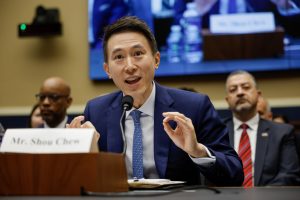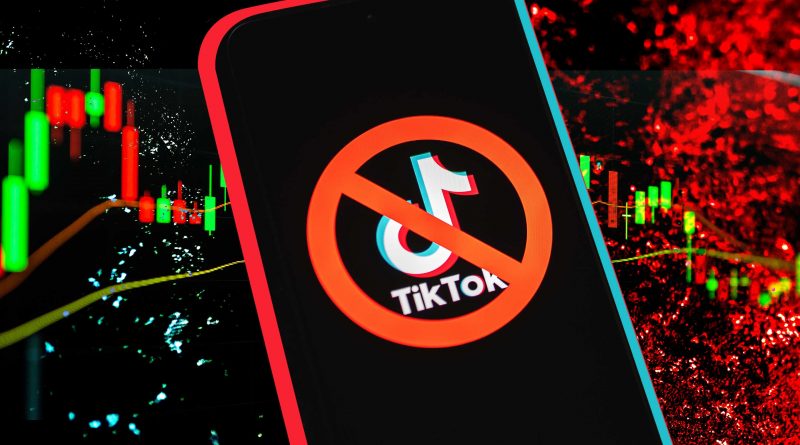Biden Administration Aims Ban at TikTok
Mark DiPietro
Technology Editor
The COVID-19 pandemic lead to rise of a whole host of new things from remote work to outdoor dining. But one of the most widespread expansions that touched almost every household in the U.S. was TikTok. From March 2020 to January 2021, the number of unique TikTok users rose over 30%. Their revenue in the U.S. also jumped exponentially. The week of March 16th, 2020 showed a 34% increase of U.S. revenues when compared to the previous week. And this growth did not stop throughout the pandemic and now 150 million Americans have the app downloaded. The seemingly fun-loving app that started as a platform full of lip synching videos convinced U.S. citizens young and old to watch and create content.
Despite this aura of levity that the general population has of the app, this rise has always been closely eyed by U.S. lawmakers. The main issue for officials is the massive amount of data on the U.S. population that the app has stored, and whose hands this data might fall into.
In order to understand what is worrying U.S. lawmakers, let us first take a look at the history of the app. In 2016, a Chinese company called ByteDance launched an app called A.me whose name was later changed to Douyin. The specialty of the app was to provide a platform in which users could lip synch to their favorite songs and other soundtracks provided by the app. It enjoyed moderate success in China, but creators aimed to take it international. A year later, the company launched in the United States under the name of TikTok in an attempt to grab more of the American market. This strategy worked because by the end of 2017 the company was able to acquire a competitor that had largely the same features with a wider American reach, Shanghai-based Musical.ly.
Combining both platforms’ already growing customer base, mixed with the hole in the short video market with the infamous app shutdown of Facebook brainchild Vine in the same year, TikTok blossomed into a healthy social media rising star until its aforementioned COVID-19 skyrocket.
This history is where the main point of concern lies for the U.S. Government, namely the direct ties to the Chinese. While the app itself is owned by Americans and is headed by Harvard-educated and Singapore-born Shou Zi Chew, the umbrella company is directly based in and subjected to CCP rules and regulations. Some in the Biden administration fear that the large swarths of American data that the app currently stores could be turned over to the Chinese government, if it has not already. The concerned officials are not making claims nor bringing forth evidence that this has happened. Rather, they are making the argument that a ban must be put in place because if the Xi Jinping-lead regime requested data on the U.S. consumers, not only would the U.S. not be able to stop it, but it also would have a low chance of even knowing such things transpired considering Chinese companies’ internal ties to the CCP.

This banning effort came to a head in late March of this year when Chew testified in front of a bi-partisan congressional committee hearing attempting to uncover evidence on how to proceed with this matter. The committee members grilled Chew for 5 hours straight on matters relating to those discussed above to TikTok’s damaging effects on teens to the Chinese government’s treatment of Uyghurs. Chew was certainly not the first Tech CEO to be dragged in front of congress in a long, dragged-out hearing that seems more like a proverbial whipping and he is not ought to be the last. And, like most CEOs in his position, TikTok did not come out looking particularly good.
A small portion of lawmakers, young voters, and free speech advocates largely make up the resistance to these efforts. While it is not an insignificant number of the population, the general feeling is that there is widespread bi-partisan support for these efforts. This sentiment was alluded to within the hearing when Tony Cárdenas, a Democrat from California, said to Chew that he has been “one of the few people to unite this committee” and then compared his performance to that of the woeful showings of Meta’s Mark Zuckerburg.
This bi-partisan support has not always been there. In 2020, former president Donald Trump tried to enact a similar ban on TikTok after banning the app on all federal government devices. He tried to force ByteDance to sell the app to an American company to mitigate the data integrity concerns. After a lengthy Cold War-style standoff between ByteDance and the Trump administration which included multiple lawsuits, multiple executive orders banning TikTok if it was not sold in a specified amount of time, and a proposed sale to Oracle; the Trump administration ultimately backed off their efforts and allowed the download of the app to continue amid the heat of the election. While Democrats hailed this move as anti-free speech and potentially xenophobically motivated at the time, a stance that likely had much to do with the hotly contested presidential election campaign happening at the time, there seems to be a real change of tune in a surprise unification of efforts.
Whether TikTok will be banned federally is an issue that must be watched with great intrigue. Additionally, if 2020 is any indication, the lawsuits that will follow a ban will certainly be fierce and plentiful. Bans at the state level have already begun. On April 14th, Montana became the first state to propose a full ban on the social media app. The bill will now be up to Governor Greg Gianforte to ultimately enact. The bill bans the operation of TikTok within state lines and bars app stores from allowing downloads. Tech markets will be greatly impacted if this trend continues, and a watchful investor should stay educated on this issue.
Contact Mark at markdipietro04@gmail.com

